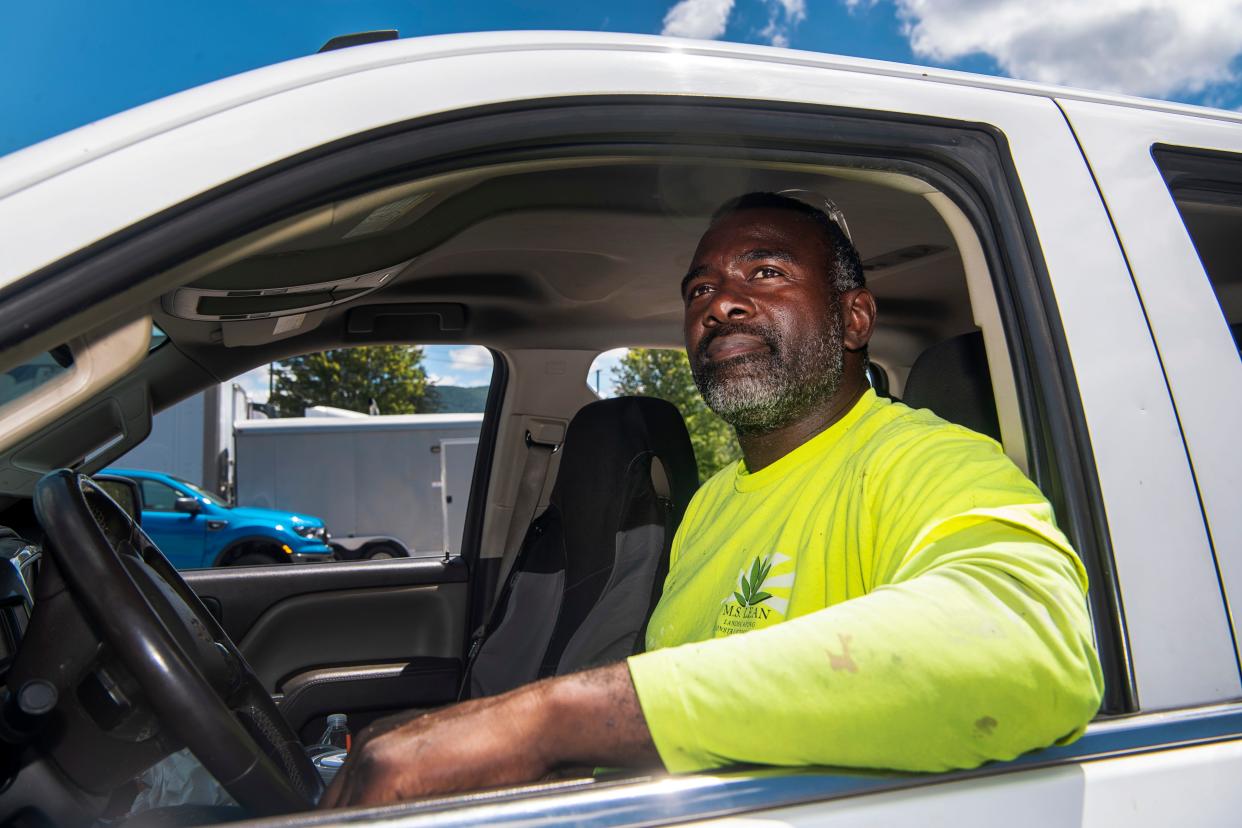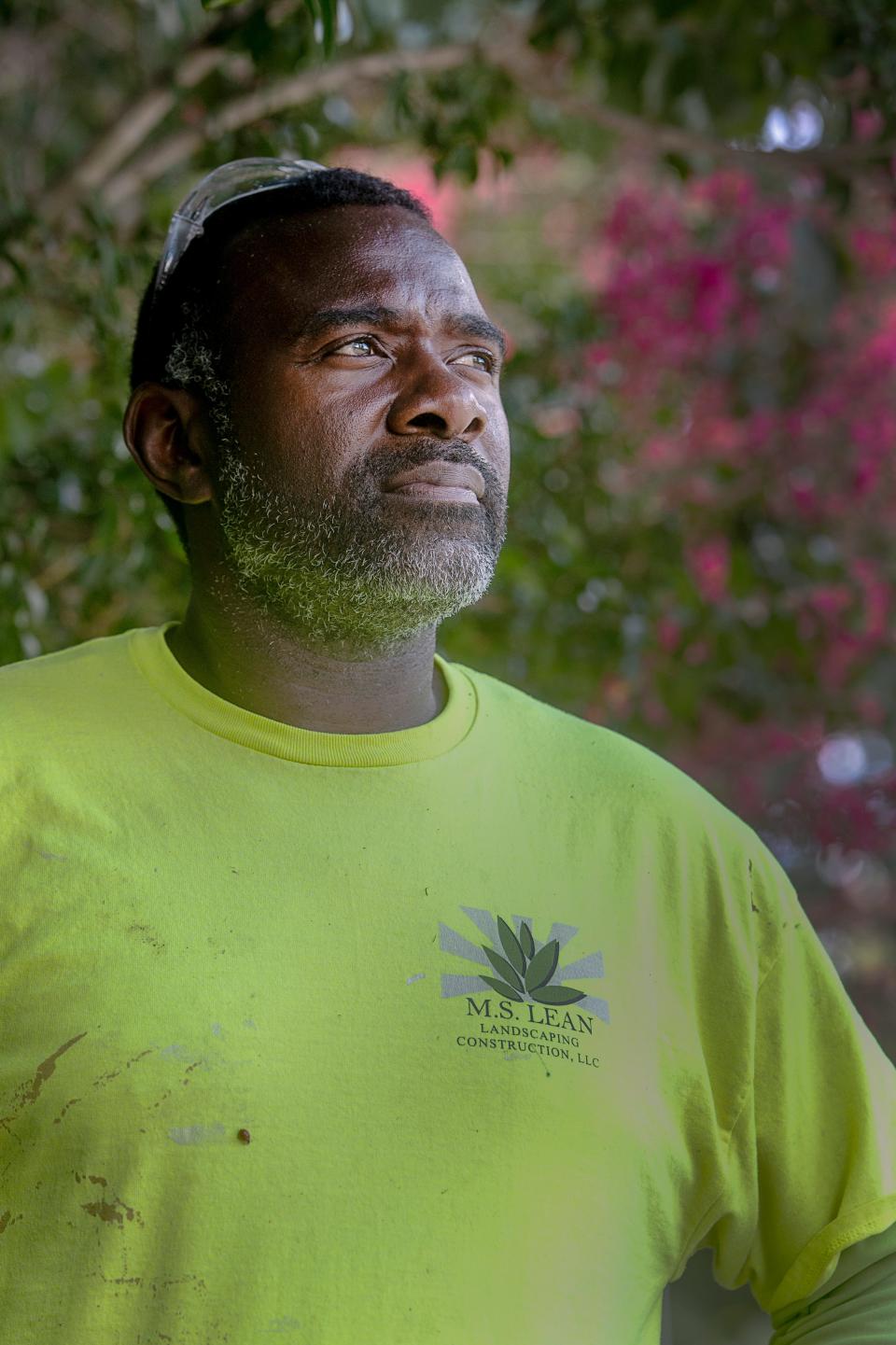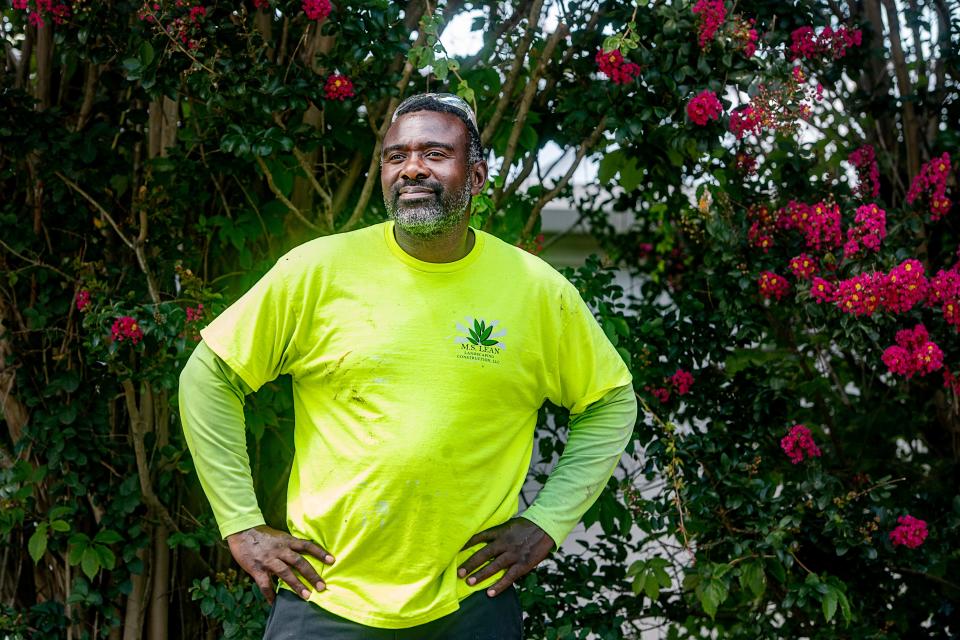Asheville Black and women-owned contractors lack access to city projects some say

ASHEVILLE - On a hot August afternoon, Stephen Smith steps out of his Chevy Silverado and onto gray asphalt. In his bright yellow T-shirt, heavy slacks and dirtied boots, you couldn’t mistake him for a waiter or a banker — he’s a landscaper.
To his count, his company, MS Lean Landscaping, is one of the few Black-owned, Asheville-based landscaping and construction companies. There aren’t many other companies like his, he says.
“It’s some ‘mom and pops.’” Smith said, referring to some very small local businesses. “I’m not really sure about the size, because its people sometimes just doing it to do it.”
MS Lean Landscaping primarily focuses on landscape maintenance and smaller construction projects. Running for 10 years, MS Lean focuses on giving “ex-offenders a chance at learning a skill set and making a living.”
As the City of Asheville has currently budgeted $251.7 million in capital projects, the Asheville Business Inclusion Office is aiming to find more minority and women-owned businesses to bid on contracts, offering up a series of outreach events to business owners, primarily focusing on local construction businesses. City contracts vary from general landscaping or sidewalk improvements to a $35.5 million improvement project to McCormick Field.
During the first event, an Aug. 16 meeting at Maple Crest Apartments, Stephen Smith was one of two Asheville-based business owners to attend.

One of the main reasons for organizing the event was to connect local businesses to prime contractors and find local minority and women-owned construction businesses, said Frank McGowan, Interim Assistant Director for Community and Economic Development for the city.
“The city definitely wants to connect with minority and women-owned businesses in the construction trades,” McGowan said.
“We’re always looking for minority businesses to be on a level playing field with other businesses, but there’s still a process by which one has to bid on a project and meet the requirements of the project.”
For the city to reach minority and women-owned businesses, they are encouraging businesses to register with North Carolina’s Office for Historically Underutilized Businesses, which will allow businesses to be more easily found when contract project managers reach out to businesses.
Prime contractors, which work on larger projects like the planned $35.5 improvement to McCormick Field, are having similar difficulty finding minority and women-owned businesses, McGowan said.

“While the city hosted that event for our own needs, what I was hearing is that the prime general contractors are having similar struggles and are looking for subcontractors, especially minority and women-owned businesses,” McGowan said.
Stephen Smith said a problem with current Asheville small businesses might be that the businesses the city wants to reach out to “don’t exist.” Asheville's Black population dropped 10.7% between 2010 and 2020, a prior Citizen Times report found.
“If you don’t have construction businesses, where are you going to come up with them?” Smith said.
“That’s putting the cart before the horse.”
'A lot of minority companies don't have the infrastructure'
Stephen Smith estimates that there are “maybe three” minority construction companies working in the area, though primarily specializing in asphalt.
On the North Carolina Department of Transportation directory of minority owned enterprises in Buncombe, MS Lean Landscaping is the only Asheville-based minority owned business that specializes in landscaping. There are 17 other minority owned businesses that specialize in a variety of subcontracting, asphalt construction and landscaping in Buncombe, but few in general contracting, according to the NCDOT directory.
More: 1st new Asheville public pool since 1970: $8.3M Grant Center expansion opens in Southside
One of the major problems, Smith says, is access to capital, where many companies cannot currently maintain payroll on large projects, as training and business infrastructure aren’t ready.
“Running a business is not like you're going into a job and everything is laid out for you,” Stephen Smith said. “You have to build. You have employees you have to pay. You got workers comp, which is really expensive. So now all these things have to be hashed out before even starting scaling and growing a business.”
Kenneth Smith runs the Charlotte-based nonprofit Grace-Mar, which aims to provide capital to starting Black businesses, alongside offering social capital to “grow and scale” operations. One of the primary reasons for starting the company was realizing that minority owned companies are "four times" more likely to hire a person of color, Kenneth Smith said.
"If there are not enough minority owned, operated companies that have the ability to hire people, then all the other work that we're doing goes for not, because there's no place for us to place these individuals workwise," Kenneth Smith said.

The issue Kenneth Smith, having a strong base is key to building a business which is competitive in the construction environment.
“One of the things that we find in our work, and we hear often from banks and municipalities, is that a lot of minority companies don't have the infrastructure,” said Kenneth Smith.
More: 1st new Asheville public pool since 1970: $8.3M Grant Center expansion opens in Southside
More: 'As a Black man, I'm appalled': Report shows gap between Black, white student achievement
Kenneth Smith acknowledges that this brings a certain level of inequity to the system of accessing contracts.
“That’s where a lot of minority organizations miss out,” Kenneth Smith said. “Because they just don’t have the level of sophistication — not because they can’t do it.”
The city plans to host another outreach event for minority and women-owned businesses within the next quarter. The next outreach event will likely be focused on “expanding the discussion on access to capital,” McGowan said.
The city established the Mountain Community Capital fund in 2019 for small businesses without collateral who are looking to receive starting loans between $5,000 and $70,000.
Stephen Smith ultimately encourages the city to invest more into Black businesses, even if they aren't necessarily in Asheville.
"Now the question becomes: are there any Black companies inside our vicinity," Stephen Smith said. "Is there any way that you can bring in businesses from outside the city of Asheville or the county to help them grow?"
Learn more
The Asheville Business Inclusion office will have a public hearing from 6-8 p.m. Sept. 19, tat the Grant Center, 285 Livingston St., on a 2023 disparity study analyzing businesses from 2017 to 2022.
Interested businesses in the process of HUB certification can find more information at https://evp.nc.gov/.
Will Hofmann is the Citizen Times Growth and Development Reporter. Email him at WHofmann@citizentimes.com.
This article originally appeared on Asheville Citizen Times: Asheville seeks minority businesses for city projects, finds few

